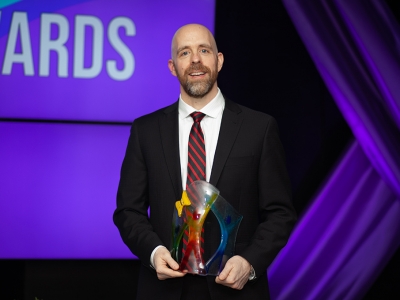By Dan Rubinstein
Photos by Matthew Murnaghan
The statistics are staggering.
Roughly 970,000,000 people around the world live with a mental health disorder, a 13 per cent increase since 2017 — and that’s not even including the surge since 2020 associated with the COVID-19 pandemic.
The cost of lost productivity due to conditions such as anxiety and depression is estimated at $1 trillion every year.
In Canada, about 6.7 million people are currently experiencing mental illness. This contributes to the $50 billion annual impact of substance use on the country’s economy. And it’s one of the reasons why 200 Canadians attempt suicide every day.

Six-time Olympic medalist and mental health advocate Clara Hughes delivers a speech at the Carleton Challenge Conference
But despite the scale of this challenge — and the fact the most vulnerable among us are suffering more than others — a brighter future is possible.
“We can all impact positive change,” Clara Hughes said at the inaugural Carleton Challenge Conference, a day-long gathering at the university designed to bring together government, academic and community leaders who are driving transformation.
“I’m speaking to a room full of people who are working toward positive change, but we can all still use a reminder.”
A six-time Olympic medallist and the founding spokesperson for Bell Let’s Talk, a campaign to end the stigma attached to mental illness, Hughes shared her own powerful story: a girl growing up in a family wracked by addiction; a teen who numbed the pain with alcohol and partying; an elite athlete who punished herself through training; and, ultimately, somebody who sought help and, more important than sporting success, found healing.
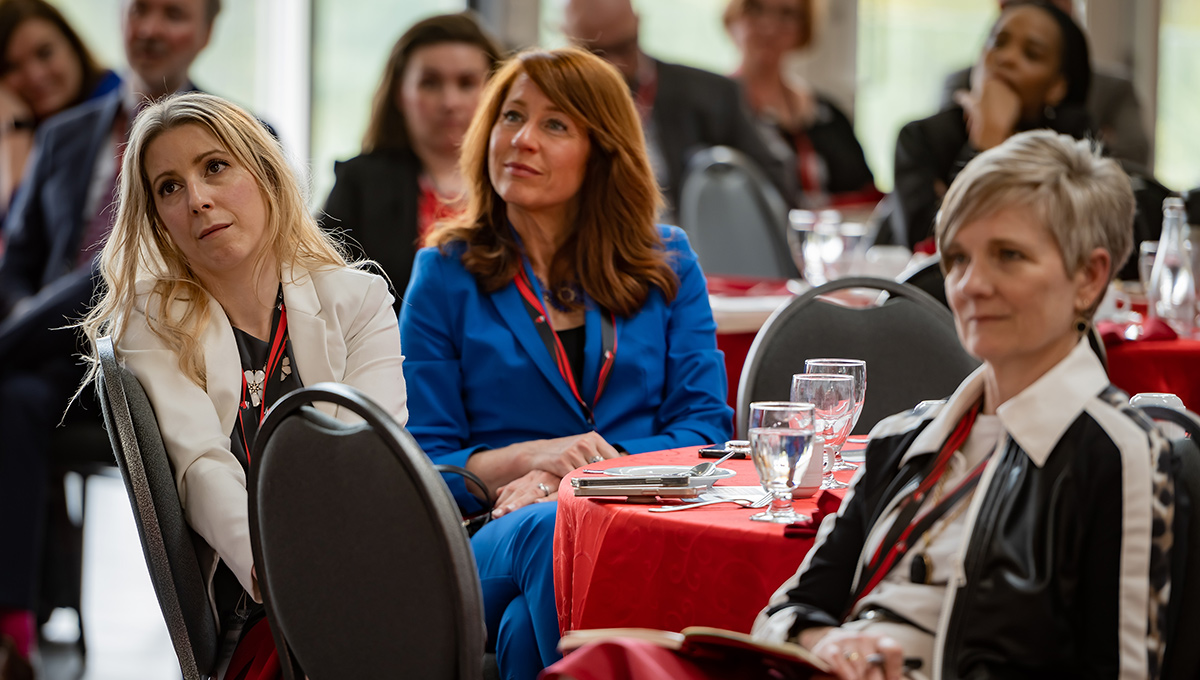
Hughes, whose words inspire others to be more open about their own struggles, emphasized the importance of empathy and listening — of “learning how to hold that non-judgemental space for somebody who might be sharing their truth for the first time.”
“All of you are moving mountains,” she said.
“We can look at the systems we work within and, if we don’t like what we see, we can change them. There has to be action.”
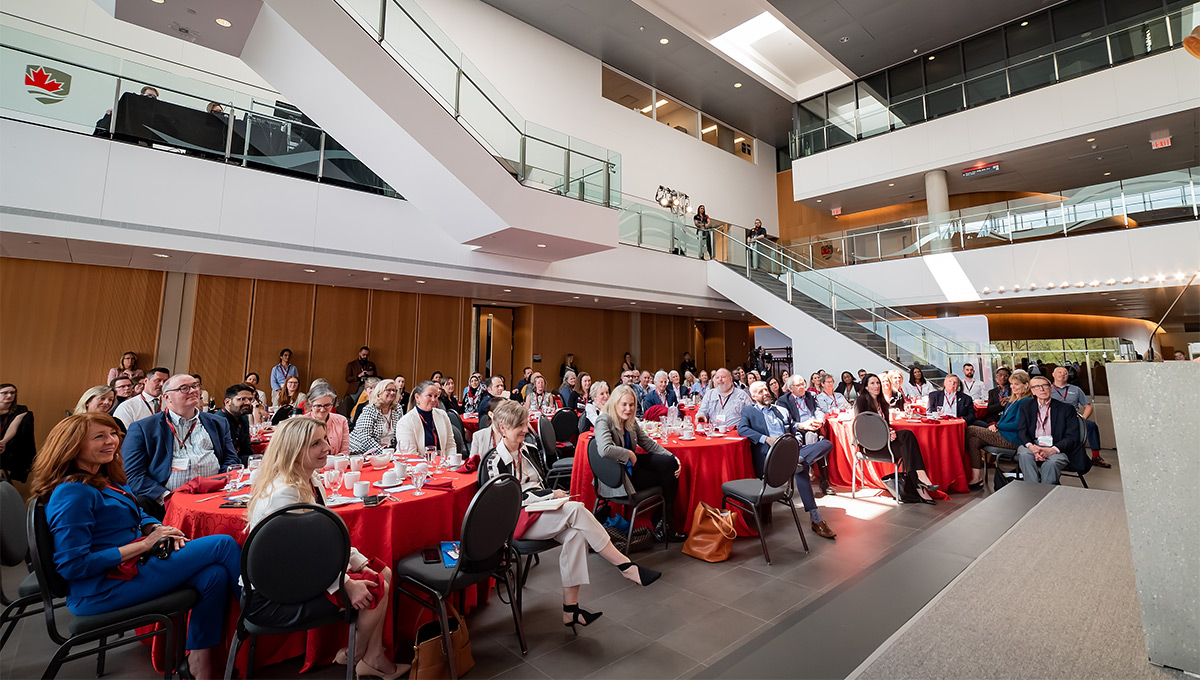
Mental Health is Health
The midday keynote address by Hughes came amid a packed agenda of speeches and panel discussions, including opening remarks from Kim Corace, the Vice-President of Innovation and Transformation at The Royal Ottawa Mental Health Centre, one of the conference’s sponsors along with media partner The Globe and Mail, the Danbe Foundation and others.
Corace set the tone for the gathering by talking about the need to truly understand the problem that we’re facing, the challenges this presents in Canada and globally, the opportunities that lay ahead and what leaders can accomplish together.
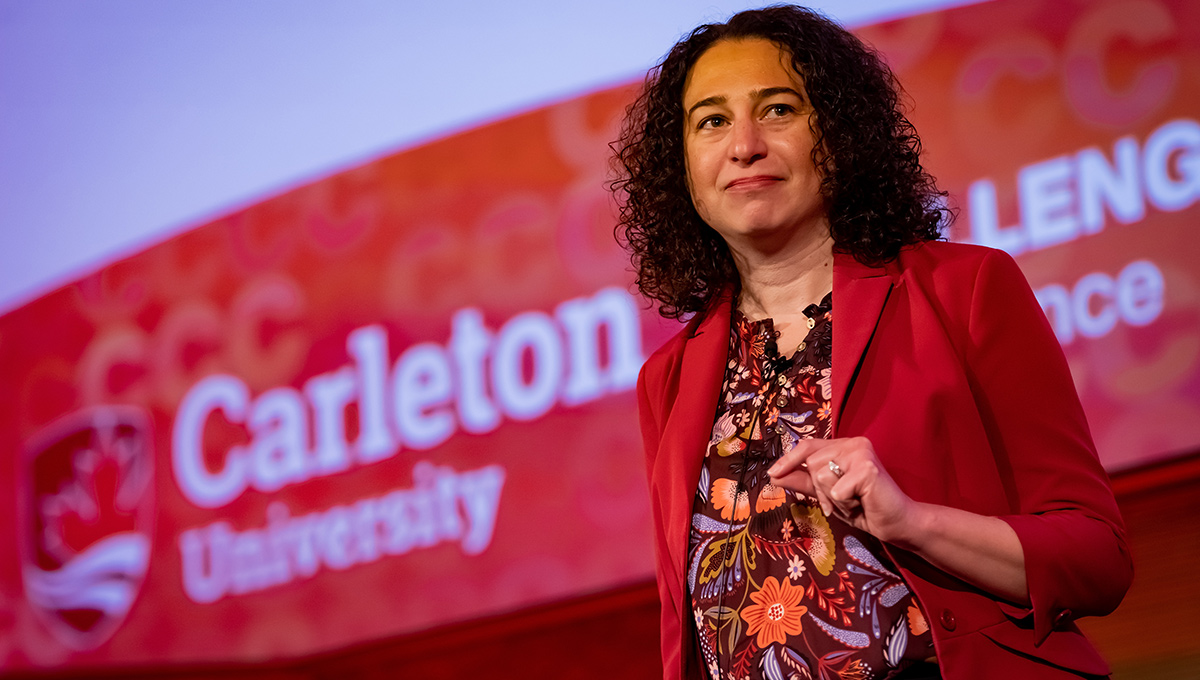
Kim Corace, Vice-President, Innovation & Transformation at The Royal
“Think about what you can bring to the table,” she urged attendees, “and bring it.”
Corace also provided an important definition: “Mental health is health — mental health is not illness. Each of us has some level of mental health all the time, just like we have some level of physical health all the time. But we don’t all have a mental illness. And even if you have a mental illness, you’re not always unwell.”
Comparing mental illness to ailments like diabetes, Corace said that if properly treated, people can live well. “But we’re never going to treat our way out of this,” she added, noting the need to invest in more “upstream” support — to address the social determinants of health, for instance, and to prevent adverse childhood experiences — so less money must be spent on “downstream” problems.
New, innovative approaches to providing health care represent a tremendous opportunity to Corace, including the rapid deployment of video appointments that emerged during the pandemic. Data is also critical to better understand the type of support people are receiving, how well it’s working and what else people need.
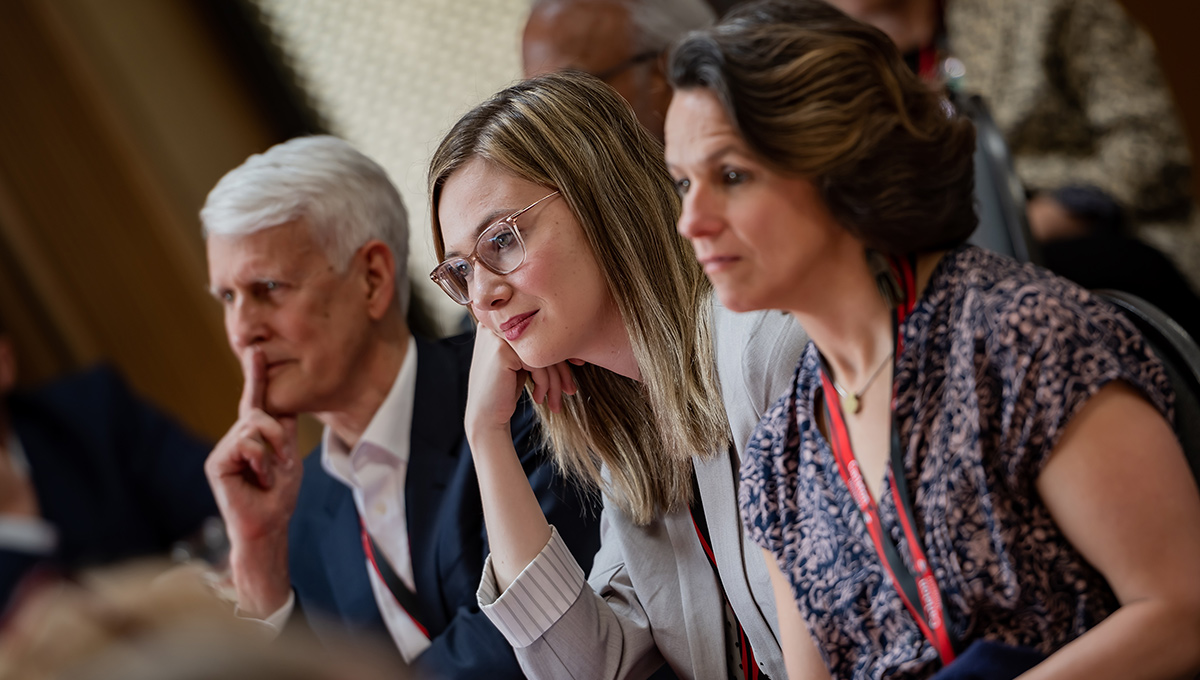
By way of example, she mentioned a centralized online access point that The Royal recently launched to provide free support with little to no wait period for mental health and substance use needs. By offering one starting point and one assessment process, the portal promises to streamline what can be a frustrating barrier for people seeking help.
“But the health-care system is not going to solve this crisis alone,” said Corace.
“Universities are not going to solve this alone. Industry is not going to solve this alone. We often talk about the burden of disease, the burden of mental illness. It’s hard to start from a deficit and get somewhere. We need to talk about the value of mental health.”
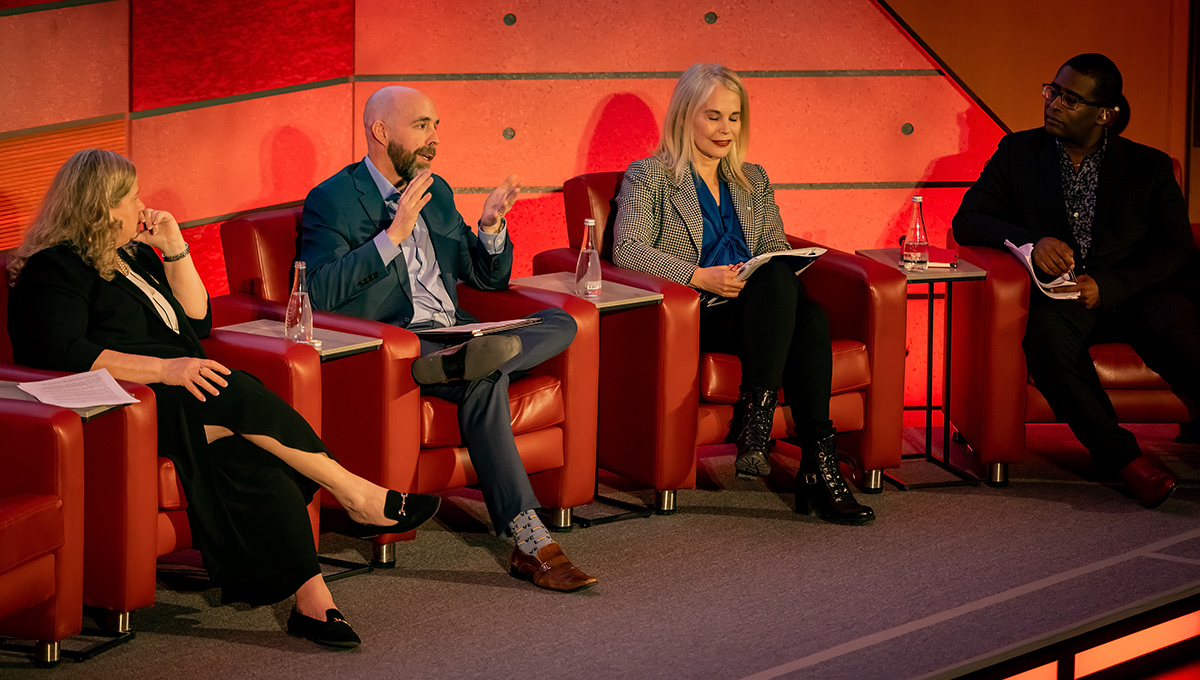
Leading Change
Picking up on this idea, Clerk of the Privy Council and Carleton alumna Janice Charette opened a panel called “Leadership as a Platform for Change” by talking about the transformation under way in the federal public service.
Although about one-third of all civil servants feel overburdened by workplace issues and demands, Charette said that the government is making progress on reducing stigma, improving access to quality research-based care and shifting its focus from individual wellness to organizational health.
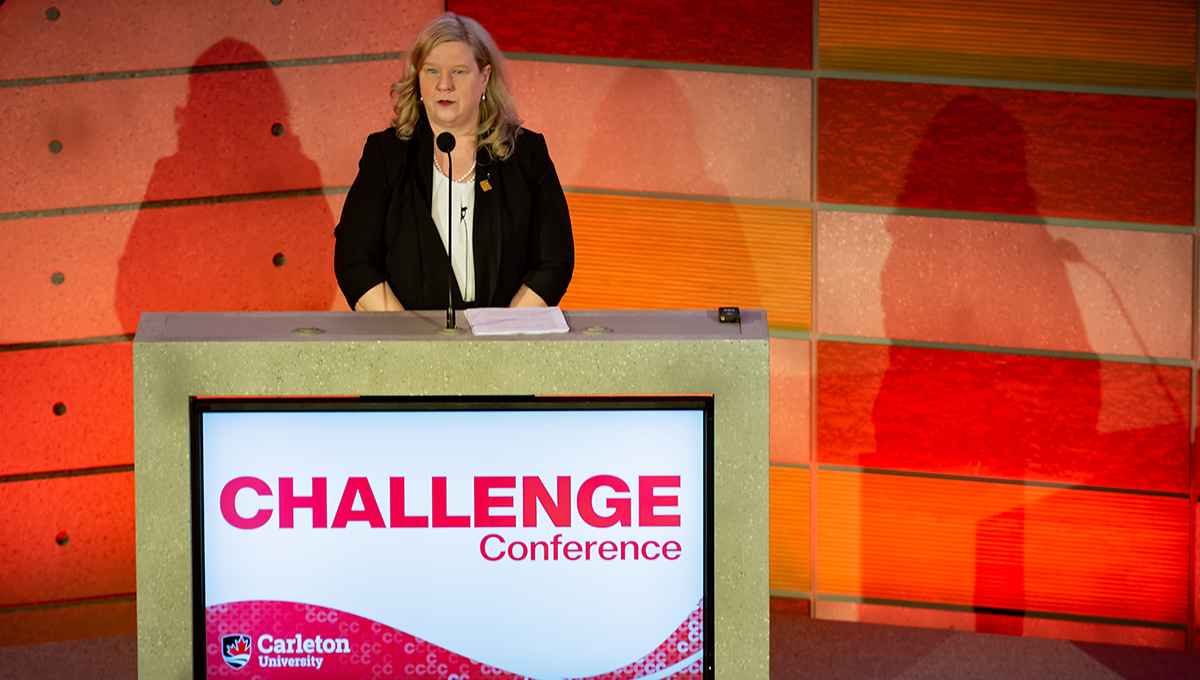
Clerk of the Privy Council and Carleton University alumna Janice Charette opens the “Leadership as a Platform for Change” panel
“As Canada’s largest employer, the federal government has a key role to play in leading change,” she said.
“It has a responsibility to Canadians for their well-being.”
But the picture inside the public service is not entirely rosy, acknowledged Charette, who is focused on examining disaggregated data to get more insight into the experiences of BIPOC and other minority employees, who tend to suffer more and have a more critical perspective.
Bell Let’s Talk Chair and Founder Mary Deacon was part of the leadership panel and echoed Charette’s comments in regard to the private sector.
“Caring about mental health is not diametrically opposed to shareholder interest,” she said. “In fact, they are perfectly aligned.”
At Bell and other companies, this alignment includes mandatory training for managers and other leaders, in which people learn the facts and myths around mental illness and how to support employees when they go on leave and when they transition back to the workplace.
“If you have employees who are happy and well at work, they’re going to be productive,” said Deacon. “It’s good for them, for their families and it’s good for the economy. If you’re the leader of a company and are not putting in place a proactive mental wellness program, you are not doing your job.”

The Cost of Mental Health panel featuring Claire de Oliveira, Senior Health Economist and Senior Scientist at the Institute for Mental Health Policy Research, CAMH, Harriet Ekperigin, Vice President, Mental Health at Greenshield Canada, Greg Fergus, MP, Parliamentary Secretary to the Prime Minister and to the President of the Treasury Board, and Kim Hellemans, Assistant Professor, Neuroscience at Carleton University
The three other panels at the conference were an opening session on the state of mental health; a deep dive into the cost of mental health and what the return on investment for mental illness prevention should look like, with Member of Parliament (and Carleton) alumnus Greg Fergus and Carleton neuroscience researcher Kim Hellemans; and a closing panel exploring the policy, technology, research and training changes needed to build a better tomorrow.
The final session began with remarks from Zach Kaminsky, the DIFD-Mach-Gaensslen Chair in Suicide Prevention Research at The Royal Institute of Mental Health Research, who talked about the impact that virtual care, artificial intelligence and other new digital and bioscience technologies can have.
His comments were followed by Mary Bartram, alumna and the Director of Policy at the Mental Health Commission of Canada. She stressed the need to put equity and a focus on the social determinants of health at the heart of policy development, and that alongside tech solutions, strengthening community-based care will ensure that people in need do not slip through the cracks.
At the end of the panel, when asked by conference emcee and Carleton journalism professor Adrian Harewood what gives her hope, Bartram said “I’m hopeful because Carleton chose this as the topic for its inaugural Challenge conference. Things like this will help keep the mental health movement going.”
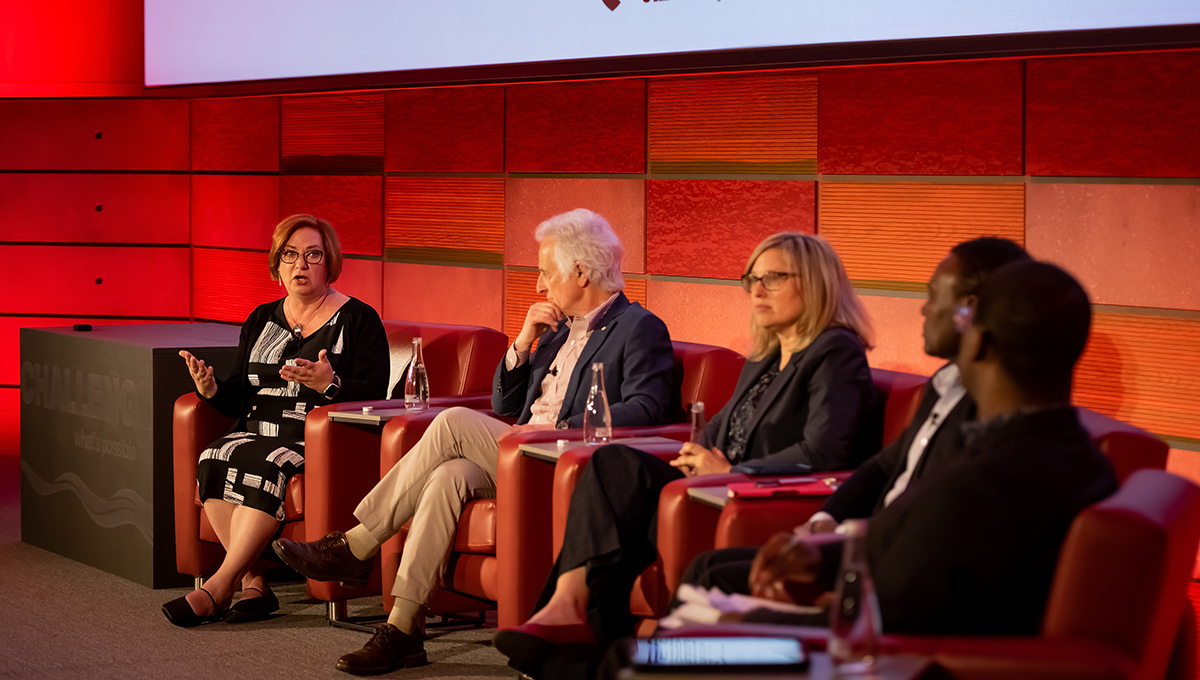
Continuing the Conversation
Carleton University President, Vice-Chancellor and cognitive neuroscience researcher Benoit-Antoine Bacon participated in the same panel as Charette and Deacon and listed what he sees as the three primary responsibilities of leaders: people need to heal themselves first; they need to acknowledge that everybody is struggling; and they need to put policies, structures and supports in place in a strategic and holistic way to help reach the “elusive state” of wellness.
“Our future is threatened by what I would call rising fear, and I think the biggest fears are inside ourselves: the fear of not being enough, fear of the other. Fear can lead to anger and depression and addictive behaviours,” said Bacon.
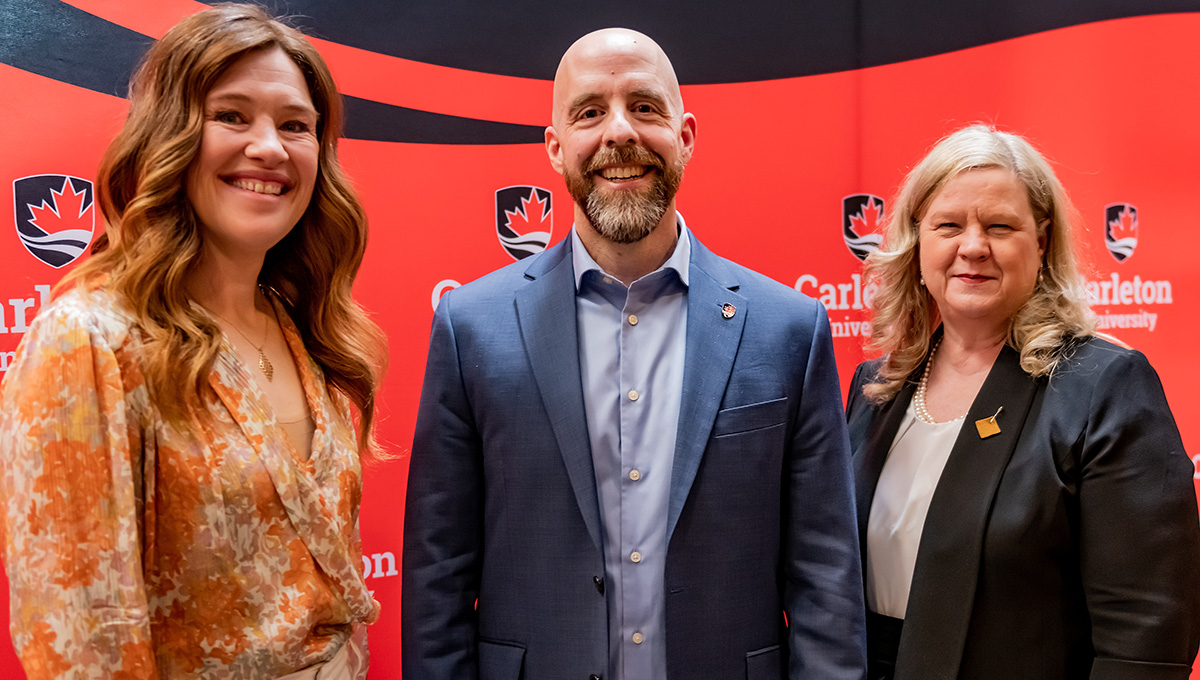
Carleton University President, Vice-Chancellor and cognitive neuroscience researcher Benoit-Antoine Bacon with Clara Hughes and Janice Charette
“There’s no cosmic justice,” he continued.
“Wouldn’t it be wonderful if everybody had the same chances from the get-go? But that’s not the way it is. And there is no wellness without equity and inclusion.”
Although we’ve become better as a society at talking about struggles in the moment, we need to be better at dealing with traumas in past and worries about the future, according to Bacon.
“Most people in this room know the mental health crisis is dire, but when I listen to mainstream conversation it’s much less clear,” he said. “We need to continue to broaden this conversation. We’re not going to solve the crisis today, but the only way to make sure mental health is at the centre of our lives is to have these discussions.”
When asked what role universities can play in this transformation, Bacon said the easy answer is conducting “research” and encouraging “open conversation.”
The hard answer, he continued, involves questioning what universities are for and going beyond the important task of preparing students for careers and a life of contributing to their communities and acquiring material things.
“I think a lot of important things in life are not material, and universities need to remind societies of this fact,” said Bacon.
“Feeling good inside is not material. Universities need to better balance what we tell our students about ‘doing’ — what they need to do — and ‘being,’ and the value of knowing that you’re good enough and being connected to yourself, to nature, to spirit and to one another.”

Wednesday, May 10, 2023 in Community, Events, Leadership, Mental Health
Share: Twitter, Facebook


